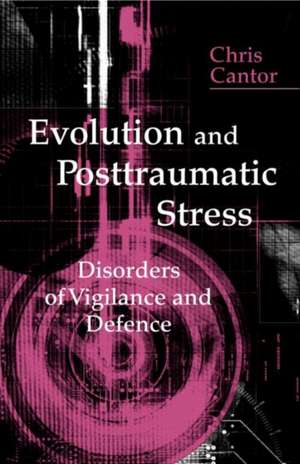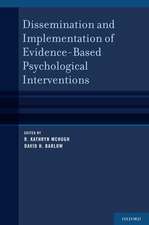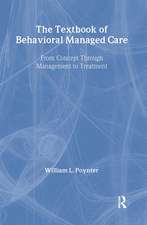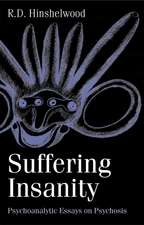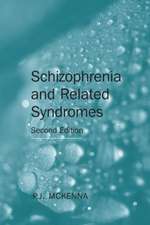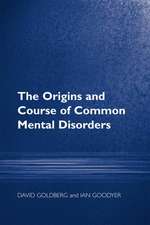Evolution and Posttraumatic Stress: Disorders of Vigilance and Defence
Autor Chris Cantoren Limba Engleză Paperback – 9 iun 2005
This book is the first to examine PTSD from an evolutionary perspective. Beginning with a review of conventional theories, Chris Cantor provides a clear and succinct overview of the history, clinical features and epidemiology of PTSD before going on to introduce and integrate evolutionary theory. Subjects discussed include:
The evolution of human defensive behaviours
A clinical perspective of PTSD
Defence in overdrive: evolution, PTSD and parsimony
This original presentation of PTSD as a defensive strategy describes how the use of evolutionary theory provides a more coherent and successful model for diagnosis, greatly improving understanding of usually mystifying symptoms. It will be of great interest to psychiatrists, psychotherapists, psychologists, and anthropologists.
Preț: 240.73 lei
Preț vechi: 288.67 lei
-17% Nou
Puncte Express: 361
Preț estimativ în valută:
46.07€ • 48.04$ • 38.29£
46.07€ • 48.04$ • 38.29£
Carte tipărită la comandă
Livrare economică 21 martie-04 aprilie
Preluare comenzi: 021 569.72.76
Specificații
ISBN-13: 9781583917718
ISBN-10: 1583917713
Pagini: 240
Ilustrații: 4 b/w images and 4 line drawings
Dimensiuni: 138 x 216 x 18 mm
Greutate: 0.44 kg
Ediția:1
Editura: Taylor & Francis
Colecția Routledge
Locul publicării:Oxford, United Kingdom
ISBN-10: 1583917713
Pagini: 240
Ilustrații: 4 b/w images and 4 line drawings
Dimensiuni: 138 x 216 x 18 mm
Greutate: 0.44 kg
Ediția:1
Editura: Taylor & Francis
Colecția Routledge
Locul publicării:Oxford, United Kingdom
Public țintă
Postgraduate, Professional, and Professional Practice & DevelopmentCuprins
Part I: Posttraumatic Stress Disorder: An Introduction. A Brief History of PTSD. The Long and the Short. The World Wars. Early Conceptualization of Traumatic Reactions. Science and Politics in Recent Times. Muddy Waters. Early Ethological Speculations. Summary. A Clinical Perspective of PTSD. PTSD as a Concept. The DSM-IV Criteria for PTSD. The Nature of Traumas and Frequency of PTSD. The Influence of Perception. Trauma and Symptom Course. War Studies. Complex PTSD. Delayed PTSD. Subthreshold PTSD. Summary. Conventional Theories of PTSD. Learning, Controllability and Predictability. Of Rats and Men. Learned Helplessness. Controllability and Predictability. Flaws of Overly Simplistic Conditioning Theories. Preparedness. Observations From Combat and Torture. Controllability and PTSD. Summary. Myopia and 21st Century
Neuroscience. Proximate versus Distal Perspective. The Triune Brain. 21st century? Facial Emotions. Essential Neuroanatomy of PTSD. Neurochemistry and PTSD. Conditioning Studies and Functional Anatomy. Neurogenesis and Plasticity. Summary. Indelible Memories, Forgetfulness and Defence. The Evolution of Memory and Awareness. State-dependent Memory and Memory Laws. Fear as a Component of a Behavioural Module. Special Police Training Insights. Emotions as Communicational States. Information Processing and PTSD. Summary. Part II: Evolution and Posttraumatic Stress Disorders. The Evolution of Human Defensive Behaviours. Ancestral Origins and Predation Pressure. In the Beginning Learning and Defence. Common Evolutionary Misconceptions. Summary. Reptilian and Mammalian Defences. Predation and Defence. Reptilian Defence. Mammalian Defence. Adaptive Conservatism and Evolutionary Stable Strategies. Summary. Predator Avoidance, Anti-predator Strategies and Foraging. The Functions of Emotions. The Ecology of Threats. Influences of Predation. Vigilance, Prey Decision-making and Activity. Cost, Benefits and Predator Sensitive Foraging. Primate Foraging Decision Studies. Summary. Family Foibles and Early Hominids. The Pathway to Humankind. Hominids. Primate and Great Ape Extrapolations. Group Size in Great Apes. Primate Research Limitations. Paleoanthropology. Hominids as Scavengers and Prey. Hunter-gatherers. Summary. Defence in Overdrive: Evolution, PTSD and Parisomony. An Evolutionary Theory of PTSD. PTSD Symptom Criteria Revisited. Adaptive or Maladaptive: the Relevance of Subthreshold States. Conclusions. Perspectives and Possibilities: Vigilance, Avoidance and Attentive Immobility. Vigilance. Predator Sensitive Foraging and PTSD: Fertile Pasture or Blind Alley? A Zonal Approach to PTSD. Avoidance. Attentive Immobility. Neurophysiology, Diagnostic Research Tests and Beyond. Conclusions. He who Fights and Runs Away...Withdrawal, Aggressive Defence and Numbing. Withdrawal. Refuging. Group Size and Individual Defence. Aggressive Defence. Numbing. Conclusions. The Paradox of Appeasement. A Hidden Problem. Appeasement Functions. A Context for Fear based Appeasement. The Stockholm Syndrome. Complex PTSD. Conclusions. A Last Resort: Tonic Immobility. Desperate Measures. Hysteria or PTSD? Future Research Directions. Conclusions. Agonic Switching, Preparedness and Psychobiological Response Patterns. Why Do We Not All Suffer PTSD if it is Adaptive? Life in Times of Threat. The Agonic Switch. Preparedness. Non-archetypal Traumas. Psychobiological Response Patterns. Trauma Contexts and Responses. Conclusions. Epilogue - PTSD in other Species?
Neuroscience. Proximate versus Distal Perspective. The Triune Brain. 21st century? Facial Emotions. Essential Neuroanatomy of PTSD. Neurochemistry and PTSD. Conditioning Studies and Functional Anatomy. Neurogenesis and Plasticity. Summary. Indelible Memories, Forgetfulness and Defence. The Evolution of Memory and Awareness. State-dependent Memory and Memory Laws. Fear as a Component of a Behavioural Module. Special Police Training Insights. Emotions as Communicational States. Information Processing and PTSD. Summary. Part II: Evolution and Posttraumatic Stress Disorders. The Evolution of Human Defensive Behaviours. Ancestral Origins and Predation Pressure. In the Beginning Learning and Defence. Common Evolutionary Misconceptions. Summary. Reptilian and Mammalian Defences. Predation and Defence. Reptilian Defence. Mammalian Defence. Adaptive Conservatism and Evolutionary Stable Strategies. Summary. Predator Avoidance, Anti-predator Strategies and Foraging. The Functions of Emotions. The Ecology of Threats. Influences of Predation. Vigilance, Prey Decision-making and Activity. Cost, Benefits and Predator Sensitive Foraging. Primate Foraging Decision Studies. Summary. Family Foibles and Early Hominids. The Pathway to Humankind. Hominids. Primate and Great Ape Extrapolations. Group Size in Great Apes. Primate Research Limitations. Paleoanthropology. Hominids as Scavengers and Prey. Hunter-gatherers. Summary. Defence in Overdrive: Evolution, PTSD and Parisomony. An Evolutionary Theory of PTSD. PTSD Symptom Criteria Revisited. Adaptive or Maladaptive: the Relevance of Subthreshold States. Conclusions. Perspectives and Possibilities: Vigilance, Avoidance and Attentive Immobility. Vigilance. Predator Sensitive Foraging and PTSD: Fertile Pasture or Blind Alley? A Zonal Approach to PTSD. Avoidance. Attentive Immobility. Neurophysiology, Diagnostic Research Tests and Beyond. Conclusions. He who Fights and Runs Away...Withdrawal, Aggressive Defence and Numbing. Withdrawal. Refuging. Group Size and Individual Defence. Aggressive Defence. Numbing. Conclusions. The Paradox of Appeasement. A Hidden Problem. Appeasement Functions. A Context for Fear based Appeasement. The Stockholm Syndrome. Complex PTSD. Conclusions. A Last Resort: Tonic Immobility. Desperate Measures. Hysteria or PTSD? Future Research Directions. Conclusions. Agonic Switching, Preparedness and Psychobiological Response Patterns. Why Do We Not All Suffer PTSD if it is Adaptive? Life in Times of Threat. The Agonic Switch. Preparedness. Non-archetypal Traumas. Psychobiological Response Patterns. Trauma Contexts and Responses. Conclusions. Epilogue - PTSD in other Species?
Notă biografică
Chris Cantor is Adjunct Senior Lecturer in Psychiatry at the University of Queensland, Australia.
Recenzii
'Chris Cantor offers a fascinating theory of evolutionary PTSD... extremely well supported by research references and offers an unusual slant on this important topic.' - Brenda Mallon, Therapy Today, November 2005
Overall Evolution and Post-traumatic Stress is effective in providing a clear yet detailed alternative perspective to PTSD. With the use of evidence-based theories ans frequent case examples, this evolutionary stance may well provide a deeper understanding of the difficulties encountered by people experiencing this form of Trauma. - Kate Lester, from The Journal of Critical Psychology, Counselling and Psychotherapy, (Vol 7, No 3) Autumn 2007
'Chris Cantor offers a fascinating theory of evolutionary PTSD... extremely well supported by research references and offers an unusual slant on this important topic.' - Brenda Mallon, Therapy Today, November 2005
Overall Evolution and Post-traumatic Stress is effective in providing a clear yet detailed alternative perspective to PTSD. With the use of evidence-based theories ans frequent case examples, this evolutionary stance may well provide a deeper understanding of the difficulties encountered by people experiencing this form of Trauma. - Kate Lester, from The Journal of Critical Psychology, Counselling and Psychotherapy, (Vol 7, No 3) Autumn 2007
'Chris Cantor offers a fascinating theory of evolutionary PTSD... extremely well supported by research references and offers an unusual slant on this important topic.' - Brenda Mallon, Therapy Today, November 2005
Descriere
Posttraumatic Stress Disorder remains one of the most contentious and poorly understood psychiatric disorders. Evolution and Posttraumatic Stress provides a valuable new perspective on its nature and causes.
